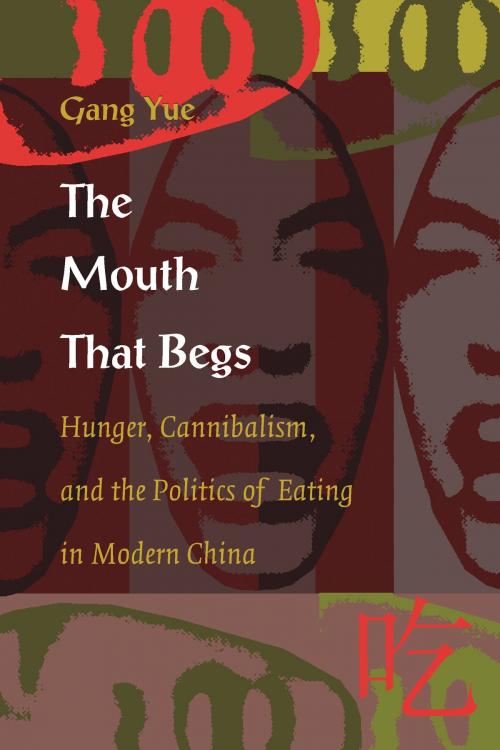The Mouth That Begs
Hunger, Cannibalism, and the Politics of Eating in Modern China
Fiction & Literature, Literary Theory & Criticism, Asian| Author: | Gang Yue | ISBN: | 9780822398516 |
| Publisher: | Duke University Press | Publication: | July 2, 1999 |
| Imprint: | Duke University Press Books | Language: | English |
| Author: | Gang Yue |
| ISBN: | 9780822398516 |
| Publisher: | Duke University Press |
| Publication: | July 2, 1999 |
| Imprint: | Duke University Press Books |
| Language: | English |
The Chinese ideogram chi is far richer in connotation than the equivalent English verb “to eat.” Chi can also be read as “the mouth that begs for food and words.” A concept manifest in the twentieth-century Chinese political reality of revolution and massacre, chi suggests a narrative of desire that moves from lack to satiation and back again. In China such fundamental acts as eating or refusing to eat can carry enormous symbolic weight. This book examines the twentieth-century Chinese political experience as it is represented in literature through hunger, cooking, eating, and cannibalizing. At the core of Gang Yue’s argument lies the premise that the discourse surrounding the most universal of basic human acts—eating—is a culturally specific one.
Yue’s discussion begins with a brief look at ancient Chinese alimentary writing and then moves on to its main concern: the exploration and textual analysis of themes of eating in modern Chinese literature from the May Fourth period through the post-Tiananmen era. The broad historical scope of this volume illustrates how widely applicable eating-related metaphors can be. For instance, Yue shows how cannibalism symbolizes old China under European colonization in the writing of Lu Xun. In Mo Yan’s 1992 novel Liquorland, however, cannibalism becomes the symbol of overindulgent consumerism. Yue considers other writers as well, such as Shen Congwen, Wang Ruowang, Lu Wenfu, Zhang Zianliang, Ah Cheng, Zheng Yi, and Liu Zhenyun. A special section devoted to women writers includes a chapter on Xiao Hong, Wang Anyi, and Li Ang, and another on the Chinese-American women writers Jade Snow Wong, Maxine Hong Kingston, and Amy Tan. Throughout, the author compares and contrasts the work of these writers with similarly themed Western literature, weaving a personal and political semiotics of eating.
The Mouth That Begswill interest sinologists, literary critics, anthropologists, cultural studies scholars, and everyone curious about the semiotics of food.
The Chinese ideogram chi is far richer in connotation than the equivalent English verb “to eat.” Chi can also be read as “the mouth that begs for food and words.” A concept manifest in the twentieth-century Chinese political reality of revolution and massacre, chi suggests a narrative of desire that moves from lack to satiation and back again. In China such fundamental acts as eating or refusing to eat can carry enormous symbolic weight. This book examines the twentieth-century Chinese political experience as it is represented in literature through hunger, cooking, eating, and cannibalizing. At the core of Gang Yue’s argument lies the premise that the discourse surrounding the most universal of basic human acts—eating—is a culturally specific one.
Yue’s discussion begins with a brief look at ancient Chinese alimentary writing and then moves on to its main concern: the exploration and textual analysis of themes of eating in modern Chinese literature from the May Fourth period through the post-Tiananmen era. The broad historical scope of this volume illustrates how widely applicable eating-related metaphors can be. For instance, Yue shows how cannibalism symbolizes old China under European colonization in the writing of Lu Xun. In Mo Yan’s 1992 novel Liquorland, however, cannibalism becomes the symbol of overindulgent consumerism. Yue considers other writers as well, such as Shen Congwen, Wang Ruowang, Lu Wenfu, Zhang Zianliang, Ah Cheng, Zheng Yi, and Liu Zhenyun. A special section devoted to women writers includes a chapter on Xiao Hong, Wang Anyi, and Li Ang, and another on the Chinese-American women writers Jade Snow Wong, Maxine Hong Kingston, and Amy Tan. Throughout, the author compares and contrasts the work of these writers with similarly themed Western literature, weaving a personal and political semiotics of eating.
The Mouth That Begswill interest sinologists, literary critics, anthropologists, cultural studies scholars, and everyone curious about the semiotics of food.















